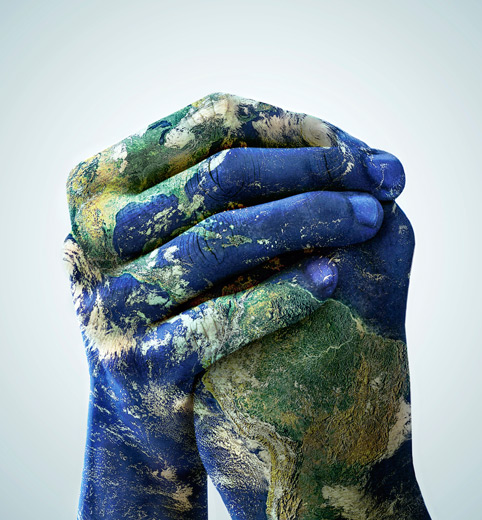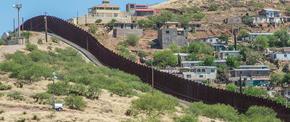The views expressed in our content reflect individual perspectives and do not represent the authoritative views of the Baha'i Faith.
Once we accept that we ought to start building an infrastructure comprised of global decision-making institutions, where do we begin?
As my friends and I continue to explore this topic in conversation, we come to realize that as with any building project, we must begin with a good design prepared by a competent architect. As we vigorously debate what will and won’t work I am, again, struck by the comprehensive and exquisite blueprint set forth in the Baha’i Writings for building a world federation:
Some form of a world super-state must needs be evolved, in whose favor all the nations of the world will have willingly ceded every claim to make war, certain rights to impose taxation and all rights to maintain armaments, except for purposes of maintaining internal order within their respective dominions. Such a state will have to include within its orbit an international executive adequate to enforce supreme and unchallengeable authority on every recalcitrant member of the commonwealth; a world parliament whose members shall be elected by the people in their respective countries and whose election shall be confirmed by their respective governments; and a supreme tribunal whose judgment will have a binding effect even in such cases where the parties concerned did not voluntarily agree to submit their case to its consideration. – Shoghi Effendi, World Order of Baha’u’llah, pp. 40-41.
At the core of the proposed Baha’i federal structure lies the institution of a world parliament, its members elected by all the peoples of the planet. This global democracy will truly represent them, and earn their trust. A world parliament will, moreover, have the authority to enact global legislation in areas of human activity that affect the collective interests of all nations. Other decisions that concern individual nations will continue to be decided at the national level.
As I think about potential areas in which the world parliament can act, I am reminded of the dire warnings that scientific experts in climate change have repeatedly issued about the increasing damage that global warming will wreak upon us if we do not stop burning fossil fuels. It seems obvious that protecting the earth’s environment by regulating the kinds and amounts of energy we can use requires a world parliament, carefully exercising its authority to protect us all.
It seems odd that our current global infrastructure does not address such an obvious and urgent need. In response to my friends’ oft-repeated complaining question: why doesn’t the United Nations do something to arrest global warming? I find myself responding that the United Nations, despite its best intentions, cannot take direct action because the UN General Assembly can only pass resolutions calling on individual nations to do so. The UN relies on the hope that nations will take its recommendations seriously enough to act on them. Otherwise it has no power to pass and enforce legislation, in the sphere of the environment or in any other sphere.
 The Baha’i teachings also envision that the world parliament will have the authority to levy a certain amount of taxes in order to fund its work on behalf of humanity. Can you imagine how necessary and useful that could be? Those funds could help us find alternative sources of clean and renewable energy to replace polluting fossil fuels, or relocate the refugees displaced by rising oceans by the end of this century.
The Baha’i teachings also envision that the world parliament will have the authority to levy a certain amount of taxes in order to fund its work on behalf of humanity. Can you imagine how necessary and useful that could be? Those funds could help us find alternative sources of clean and renewable energy to replace polluting fossil fuels, or relocate the refugees displaced by rising oceans by the end of this century.
Universal benefits would also accrue when the international community had the necessary funds to help member nations with severe financial difficulties, or assist in places where starvation or disaster looms. With that more global approach, rich nations need no longer feel like they must always bail out their poorer relations. In such a system, with everyone paying their fair share of taxes, all peoples and nations would invest in the system, and make sure it behaves in financially responsible ways.
The Baha’i writings also envision another key responsibility for a world parliament—acting as the trustee of all the world’s most important natural resources. In other words, the parliament will have the exclusive power to develop, manage and distribute all critical natural resources for the benefit of humanity as a whole. These resources could well include energy, water and food. By managing such human necessities under the authority of a decision-making institution that represents the collective interests of all nations, the Baha’i teachings ensure the equitable distribution of resources based on legitimate need. Such a system is at once simple, yet elegant and brilliant. It would prevent and eradicate a large number of conflicts that we currently fight in our quest for resources such as oil, gas, clean water and food.
How do we fund these profound principles? The Baha’i writings envision a day when all nations will give up all rights to maintain arms, except in the amount they require to keep order within their borders. They will also cede all rights to make war on other nations, with the world parliament maintaining a collective standing army that represents all nations. The enormous sums of money the nations of the world now spend on weapons and war would drop dramatically, and we would need only a fraction of that amount to meet the basic needs of all humanity.
You May Also Like
Comments

















http://www.amazon.ca/Beyond-Borders-Proposals-Democratic-Government/dp/1499658907